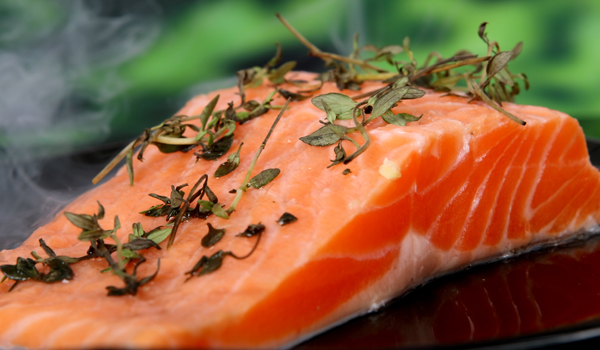Fish Fat and Fiber Together Fight Colon Cancer

WASHINGTON Dietary fiber and healthy fats from fish, known as omega-3 fatty acids, may work together to protect against colon cancer, recent studies suggest.
"When we put both fiber and omega-3 fatty acids together, there's a true synergism that we don't see with either one alone," said study researcher Robert Chapkin, a professor at Texas A&M University.
If fiber is eaten with a different type of fat, such as fat from vegetable oil, the anti-tumor effect is far weaker, according to Chapkin's studies in mice.
The results may explain why studies in both animals and people have found conflicting results regarding whether fiber and omega-3s can reduce cancer risk . Studies on people may need to factor in the interaction between these two dietary components to get better picture of their benefit, Chapkin said.
Chapkin discussed his findings here this week at the American Institute for Cancer Research annual meeting.
The right fat
Chapkin and colleagues have conducted many studies in animals using omega-3 fatty acids and butyrate, a compound that forms when soluble fiber is broken down in the colon. Mice fed these two compounds have a reduction in tumor formation in their colon . However, the combination of fiber and corn oil actually promoted cancer, Chapkin said.
Get the world’s most fascinating discoveries delivered straight to your inbox.
"Butyrate alone can be the devil or the angel," depending on which type of fat is consumed along with it, Chapkin said.
More recent studies suggest butyrate and omega-3s promote the killing of unhealthy or damaged cells. This process helps to rid the colon of cells that may turn cancerous, Chapkin said.
While you might not want to bolster cell death in other parts of the body, such as your brain, "in the colon, it's a good thing," Chapkin said.
Chapkin noted that butyrate is only present in significant amounts in the colon, so the process of enhanced cell-killing brought about by eating fiber and omega-3s together likely doesn't occur elsewhere.
What foods to eat
It's still unclear whether the synergistic effect of these two compounds occurs in people. And if it does, you'd likely have to consume large amounts of omega-3s to see a benefit.
Chapkin said his studies suggest that around 3 grams of omega-3s daily may be needed. The average American eats just 5 percent of omega-3s a day, or 150 milligrams.
Foods high in omega-3s include fatty fish, such as salmon, herring and sardines. Omega-3 supplements might also make it possible to consume high amounts of this compound.
Pass it on: Eating healthy fats from fish together with fiber may reduce colon cancer risk.
- 10 New Ways to Eat Well
- 6 Foods That Are Good For Your Brain
- 10 Doâ??s and Donâ??ts to Reduce Your Risk of Cancer
Follow MyHealthNewsDaily staff writer Rachael Rettner on Twitter @RachaelRettner. Find us on Facebook.

Rachael is a Live Science contributor, and was a former channel editor and senior writer for Live Science between 2010 and 2022. She has a master's degree in journalism from New York University's Science, Health and Environmental Reporting Program. She also holds a B.S. in molecular biology and an M.S. in biology from the University of California, San Diego. Her work has appeared in Scienceline, The Washington Post and Scientific American.
 Live Science Plus
Live Science Plus





